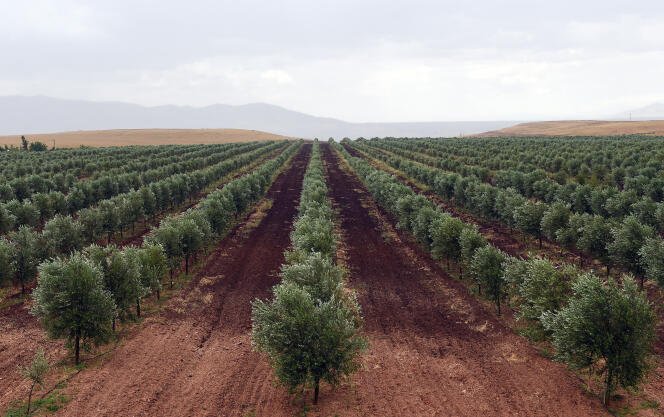Authorization will now be required to export olive oil from Morocco. The measure, which follows the publication in Official Bulletin of an order from the Ministry of Commerce, aims to “stabilize consumer prices” And “remains valid until December 31, 2024”announced Thursday, October 12, the Ministry of Agriculture.
“We have asked to limit the export of olive oil, because prices have increased significantly and are likely to increase further due to the drought. The situation is catastrophic not only in Morocco, but throughout the western Mediterranean region”, explains Rachid Benali, president of the Moroccan Interprofessional Olive Federation. In Spain and Italy, the two world leaders in the sector, extreme heat has strongly affected crops. On Thursday, a kilo of extra-virgin oil reached 9 euros on the Jaén Stock Exchange, the main production province in Spain. It was worth less than 6 euros a year ago.
Ranked in the top 10 olive oil producers, Morocco is not spared from this worrying climatic situation. In September, temperatures frequently reached 35°C in the Meknes region, the country’s leading production area. “The harvest has been difficult for several yearsrecognizes an operator. Rainfall is decreasing, summers are hotter and winters are not cold enough, which slows shoot growth and reduces yields. »
A “political” decision
Non-irrigated areas, which represent 80% of olive crops, are particularly vulnerable. As for the others, which require on average 2,500 m3 of water per hectare per year in the north of the country, but double or even triple in the south, they aggravate already considerable water stress.
In this context, olive oil production for the 2023-2024 campaign will fall by a third, according to professionals. “Morocco should produce around 80,000 tonnes, compared to 120,000 tonnes in 2022”, predicts Noureddine Ouazzani, who directs the Agropôle olivier in Meknes. A hard blow for the sector, which employs 200,000 people and represents two thirds of the arboricultural area in Morocco and almost a quarter of the working days in agriculture.
In a market marked by the collapse of production and the absence of stocks, prices soared. A ton of virgin olive oil increased from 70,000 dirhams in 2022 to more than 85,000 dirhams (around 7,765 euros). The increase is just as clear for extra-virgin olive oil, which is now worth around 100,000 dirhams per tonne, compared to 85,000 in 2022.
Expected for several weeks, the limitation of the export of olive oil is not unanimous. Many actors are “the absence of dialogue” and point to a decision “essentially political”. “We will only know the exact contours of the decree in the coming days, underlines a farmer. Bulk exports will be prohibited, that’s for sure, and exemptions will likely be granted for value-added products, such as packaged oil.. But it will be necessary to request authorization and it is the Ministry of Agriculture which will ultimately decide. »
Support producers
“Limiting exports will not lower priceswarns Noureddine Ouazzani. To produce a liter of oil, you need around six kilos of olives, which today represents a cost of 70 dirhams without transport, crushing or packaging. What margin do we want to leave to the producer? »
This is not the first time that Morocco has limited the export of its agricultural products. In February, sales of tomatoes, onions and potatoes to West Africa were temporarily stopped to counter soaring prices. But the measure did not have the expected effect: in Casablanca, a kilo of tomatoes costs up to 12 dirhams in places, almost three times more than normal. At the end of August, the High Commission for Planning put the average increase in the food products index in Morocco at 10.4% over the last twelve months.
As a result of the announced restrictions, olive oil professionals are betting on a sharp drop in exports – they will barely reach 10,000 tonnes in 2022 – and insist on the need to support producers. “Due to climate change, we will always have drought problems, with production at half-mast every four or five years, warns a farmer. To lower prices, it would have been more relevant to grant an exceptional subsidy to farmers. »
